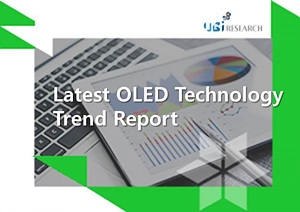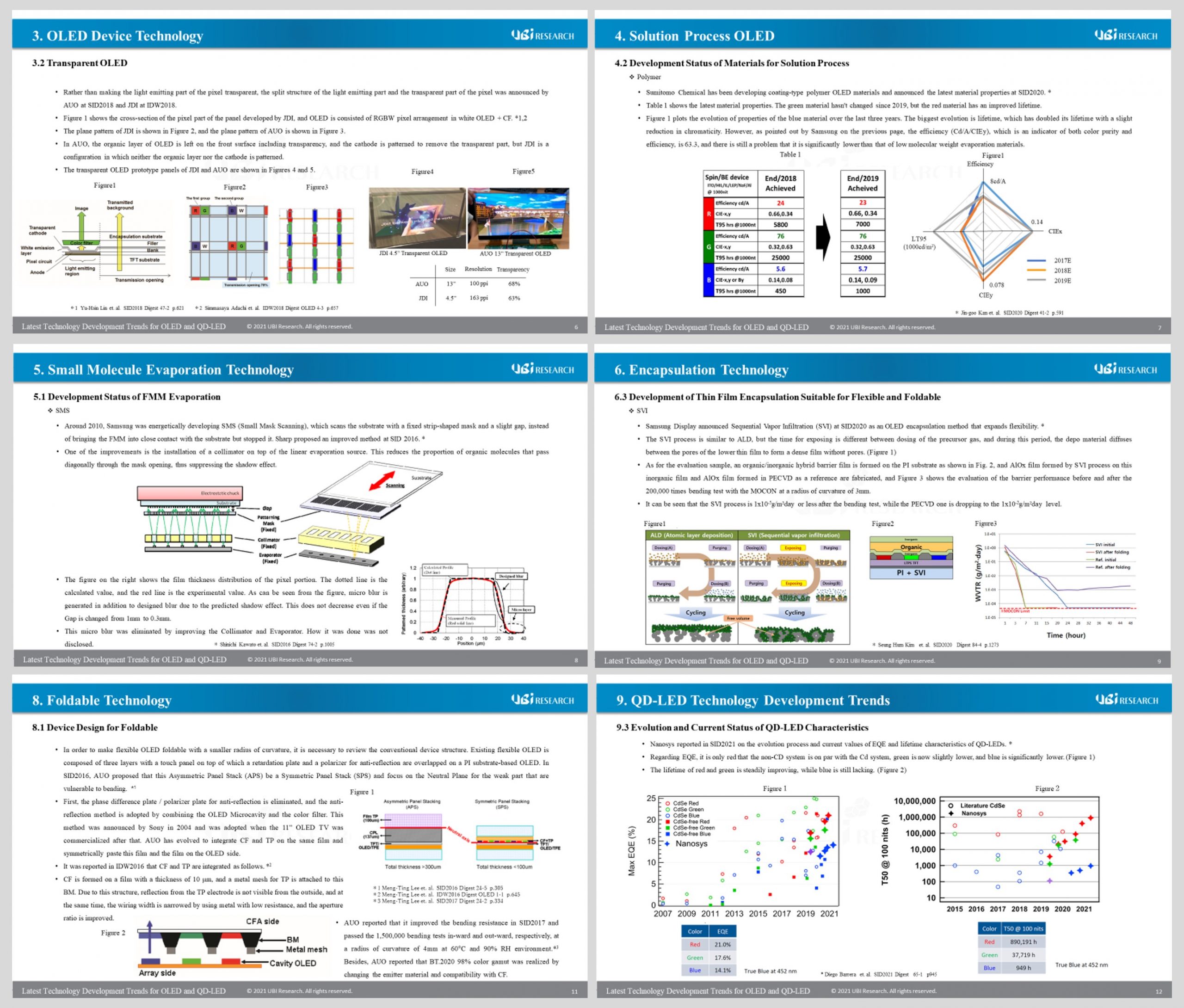Special Report
Latest Technology Development Trends for OLED and QD-LED
₩5,000,000
August 29, 2021
PDF(187P)Introduce
OLED, which is used in premium products for smartphones and TVs, is expanding its market to the fields of laptop computers and monitors.
However, smartphones have continued to evolve, and the era of foldable phones has arrived. Furthermore, by adopting UPC (under display camera) technology, a full screen display with no holes for the camera was born. In order to make a foldable OLED or a full screen display, it is necessary to improve the characteristics of various components and materials that make up the OLED and to deform the structure of the OLED panel itself.
Various new technologies have been introduced in large-size OLED for TV. Structural deformations and high-performance light-emitting materials are used to make rollable displays and high-brightness TVs.
Nevertheless, OLEDs continue to evolve to be human-friendly and convenient.
The “Latest Technology Development Trends for OLED and QD-LED” report published this time contains the latest technology trends that show the current state of evolving OLED and the future evolution direction.
In addition, the latest technological trends related to QD-LED, which is called next-generation display technology following OLED, are also included in this report. If the LED itself emits light, it will be a self-luminous device with a wide color gamut, and since the solution process is possible, the manufacturing cost can be reduced, so expectations are rising as a next-generation device.
Contents
1.Small Molecule Material
1.1 Fluorescent Material
1.2 Phosphorescent Material
1.3 TADF
1.4 Hyperfluorescence
1.5 Proposal of Next-Generation Emitting Material
1.6 Material Development by AI
1.7 Summary
2.White OLED+CF
2.1 Bottom-emission White OLED+CF
2.2 Top-emission White OLED+CF
2.3 Improved Characteristics of White OLED + CF Method
3.OLED Device Technology
3.1 Inverted OLED
3.2 Transparent OLED
3.3 Electrode Material
3.4 Polarizer
3.5 Dependency Analysis of Color Viewing Angle
3.6 Wide Viewing Angle Technology
3.7 Transparent Cathode for Top-Emission
3.8 Tandem Blue OLED for QD-OLED
3.9 Rollable OLED Display
3.10 High Temperature Durable OLED Display Suitable for In-Vehicle Use
4.Solution Process OLED
4.1 Solution Process OLED Status and Issues
4.2 Development Status of Materials for Solution Process
4.3 Comparison of Solution Process Materials and Small Molecule Materials for Evaporation
4.4 Solution Process Technology
4.5 Solution Process Device Technology
4.6 Solution Process Display
5. Small Molecule Evaporation Technology
5.1 Development Status of FMM Evaporation
5.2 Effect of Evaporation Conditions on the Film
5.3 Characteristic Reproducibility of Small Molecule Evaporation OLED
5.4 Lithographic Patterning of Small Molecule Evaporation Film
5.5 Small Molecule Evaporation System for Mass Production
5.6 Material Deterioration in The Evaporation Source
5.7 Ultra-High Definition Mask for Small Molecule Evaporation
6.Encapsulation Technology
6.1 Development Status of Thin Film Encapsulation Technology
6.2 Moisture Intrusion Mechanism in Thin Film Encapsulation
6.3 Development of Thin Film Encapsulation Suitable for Flexible and Foldable
6.4 Face Seal
7.Light Extraction
7.1 Improved Light Extraction by Molecular Orientation
7.2 Improved light Extraction by Adjusting The Refractive Index
7.3 Improved light Extraction by Removing Waveguide Mode
7.4 Improved Light Extraction by Installing Structures
8.Foldable Technology
8.1 Device Design for Foldable
8.2 Development for Neutral Plane Splitting
8.3 OCA for Neutral Plane Splitting
8.4 Development of Materials for Foldable
8.5 Impact of Foldable on TFT and Countermeasures
8.6 LTPS Process Suitable for Foldable
8.7 Foldable Display
9.QD-LED Technology Development Trends
9.1 Core-Shell QD-LED
9.2 Quantum Dot
9.3 Evolution and Current Status of QD-LED Characteristics
9.4 Development of Non-Cd Blue QD
9.5 Development of Non-Cd Red QD
9.6 QD-LED Device Structure
9.7 QD-LED Process
9.8 QD-LED Display Prototype
9.9 White Emitting QD-LED
9.10 Perovskite
Report Sample
Previous Report Status
Related Products
-

Latest OLED Technology Trend Report
₩3,500,000September 15, 2020
PDF(133P)The “Latest OLED Technology Trend Report” analyzed the research presented by display companies, research institutes, and universities in SID, IMID, IDW from 2016 to 2020, and carefully selected and organized only the technology used in OLED manufacturing and the technology deemed applicable in the future.
It was compiled by Urabe (former Sony OLED development team leader/development director), a senior analyst at UBI Research.
The report will be a guideline that shows OLED developers the goals and directions of development by technology. -

Display Application Technology Development Trend of Quantum Dot Report
₩0July 17, 2024
PDF(95P)Quantum Dot (QD) technology is attracting attention in the display industry due to various issues such as utilizing QD films, combining mini LEDs and QD, commercializing Cd-free QD, developing Perovskite QD, and research and development for QD-LED next-generation displays.
-

2025 Automotive Display Technology and Industry Trends Analysis Report
₩0February 18, 2025
PDF(217P)The automotive industry is undergoing rapid transformation beyond mere mechanical innovation, entering the era of Software-Defined Vehicles (SDVs). As autonomous driving technology and electric vehicle advancements accelerate, cars are evolving from simple transportation tools into smart devices centered around user interaction.


